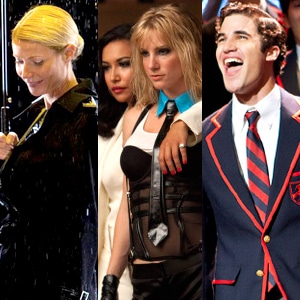 Fox
FoxDo artists benefit financially from having their songs in Glee? Please tell me Kings of Leon will regret their snub.
—Liz Ruiz, via Twitter
As much as entertainment reporters love the word "snub," it's time to grow up. A TV show wanted to license a Kings song, but the timing wasn't right for the band. It's not a "snub" or "diss."
It's not, as apparent megalomaniac Ryan Murphy fantasizes, an attack on The Arts. It's business. Get over it. As for the money that the Kings may have left on the table, here's what I can tell you:
First, let's be clear: The Brothers (and one cousin) Followill do not need Murphy's money. Their records tend to go platinum, oh, you know, three times over, if not nine times.
However, had the band bowed unto Murphy, they probably would have pocketed a decent chunk of extra cash.
According to Tom DeSavia, whose Notable Music licensed the standard "Hey Big Spender" to the show, Glee can be the gift that keeps on giving.
First, there's the initial fee, which varies so widely that industry people have a hard time giving me a range. (The Wrap estimates the music budget for a typical network program at $150,000 to $200,000, with the average song garnering a licensing fee of $10,000 to $15,000. A bigger name can charge up to $50,000 per song. We know that Eminem's asking price of $200,000 for "Lose Yourself" proved too steep; ergo the ceiling falls somewhere beneath.)
The fee is higher if the song will be used for a production number, versus, say, a non-cast member singing a few bars.
And of course this doesn't even count the royalties a star gets if the song is officially covered by the Glee cast, included on a Glee album, and then played in that format on the radio and sold in the iTunes and on and on and on.
But it doesn't end there. Yes, sales of the original song almost invariably get a boost on iTunes the very next day, routinely appearing in the digital store's top 10 singles for at least the next 24 hours. Take Rihanna, whose "Take A Bow" single reportedly saw a 189 percent sales increase after it was covered on Glee.
But wait, there's more! In fact, there's future money that hasn't even been made yet.
"A show like Glee is so incredibly iconic that it's only a matter of time before it goes into syndication," DeSavia notes. "So every time that show runs, the song will earn more income."
Not as much as it earns during an episode's first run, or first repeat, but some.
"Every time those episodes get played, that's a couple bucks," figuratively, DeSavia says.
So, yes, the Kings could have bought new crowns with the money they would have earned. But then again, avoiding Murphy's tantrums also seems like a payment in itself.